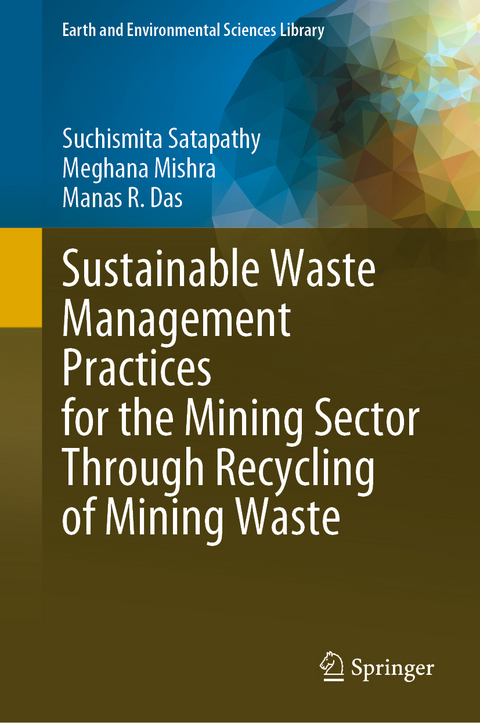
Sustainable Waste Management Practices for the Mining Sector Through Recycling of Mining Waste
Springer International Publishing (Verlag)
978-3-031-67931-5 (ISBN)
- Noch nicht erschienen - erscheint am 11.12.2024
- Versandkostenfrei
- Auch auf Rechnung
- Artikel merken
Mining waste management is an important issue for the mining industry since it entails the safe and responsible disposal of waste created during mining operations. This waste comprises tailing, waste rock, and other mining wastes that, if not adequately managed, can pose environmental and health problems. Effective waste management solutions are required to reduce the environmental impact of mining and preserve the long-term viability of mining operations. These initiatives include improving mining practices to reduce waste generation, establishing effective waste treatment and disposal systems, and participating in community outreach and education programme. In recent years, there has been a growing emphasis on the use of new mining waste management technologies and practices. The adoption of modern filtration systems, bio-remediation techniques, and the rehabilitation of abandoned mining sites are examples of these. Overall, good mining waste management is critical for guaranteeing the mining industry; long-term sustainability and protecting the environment and communities where mining operations take place. Sustainable waste management is the implementation of practices and strategies that aim to minimize aim the negative impact of mining waste while promoting resource efficiency and long-term economic viability it involves employing a thorough approach that considers the entire mining waste lifetime, from generation to disposal, and seeks to reduce waste generation, reuse, or recycle items, and appropriately dispose of any remaining rubbish. It attempts to extend the life of materials while reducing the waste volume that is incinerated or dumped in landfills. To lessen the detrimental environmental, economic, social and effects in consumption, a thorough approach to sustainable waste management must concentrate on the life cycle of a product. Mining wastes can be categorized into overburden, waste rock, tailings and mine water. During mineral extracted, beneficiated, and processed, mining wastes are produced. The first stage, known as extraction, which is the first layer sacking of minerals. Typically, blasting is used to do this, which produces a significant amount of garbage (soil, debris and other material). This is usually only concentrated within the periphery of a mine rental place and occasionally on public land, and is useless to the industry. The amount of waste produced increases with the size of the mine. Because they produce far more trash than underground mines, opencast mines are consequently more pollutant-intensive. Use of tailing waste of iron mines with clay for producing bricks can lead to consumption of large quantities of the waste materials and managing it in an environmentally friendly way. On the other hand, it can reduce consumption of top soil for making bricks and improve construction materials availability. Similarly, for preparation of ceramics and polymer composite, these wastes can be used, which will help in solving social, environmental problem.
Suchismita Satapathy is an associate professor in the School of Mechanical Sciences, KIIT University, Bhubaneswar, India. She has published more than 130 articles in national and international journals and conferences. She has also published many books and e-books for academic and research purposes. Her areas of interest include production operation management, operation research, acoustics, sustainability, and supply chain management. She has filled three Indian patents, among them two published. She has more than 15 years of teaching and research experience. She has guided many Ph.D. (three completed, three ongoing), MTech (20), and BTech (49) students. Suchismita has published books such as Production operation management (Stadium Press) and MCDM methods for waste management with CRC Press, Innovation, Technology, and Knowledge Management with Springer, Soft Computing and Optimization Techniques for Sustainable Agriculture by DEGRUYTER, The PDCA cycle for industrial improvement, applied case studies by Springer and many of her projects are ongoing.
Meghana Mishra is a research scholar in the School of commerce in KIIT University, Bhubaneswar, India. She has published more than 6 articles in national and international journals , conferences and book chapters. Her areas of interest include production operation management, Economic study of Agrisector,sustainability,Business process reengineering,ergonomics etc.
Manas R Dash is a research scholar in the School of Mechanical sciences at KIIT University, Bhubaneswar, India. he has published more than4 articles in national and international journals , conferences and book chapters. His area of research is mining waste management.
Waste Generation from Mines.- Literature review on Waste generation from mines.- Barriers of Sustainable Mining Waste Management Practices.- Designing a framework for Sustainable mining waste management practices.- Catagorizing Waste and Utilizing them by fabricating and testing bricks for various properties and solving noise issues.- Use of mining waste as ceramics and testing for their properties.- Using mining waste to improve polymer composite properties.
| Erscheinungsdatum | 21.11.2024 |
|---|---|
| Reihe/Serie | SpringerBriefs in Earth System Sciences |
| Zusatzinfo | XVIII, 60 p. 59 illus., 58 illus. in color. |
| Verlagsort | Cham |
| Sprache | englisch |
| Maße | 155 x 235 mm |
| Themenwelt | Naturwissenschaften ► Biologie ► Ökologie / Naturschutz |
| Technik | |
| Schlagworte | Bricks • Ceramics • Polymers • sustainability • waste management |
| ISBN-10 | 3-031-67931-8 / 3031679318 |
| ISBN-13 | 978-3-031-67931-5 / 9783031679315 |
| Zustand | Neuware |
| Haben Sie eine Frage zum Produkt? |
aus dem Bereich


